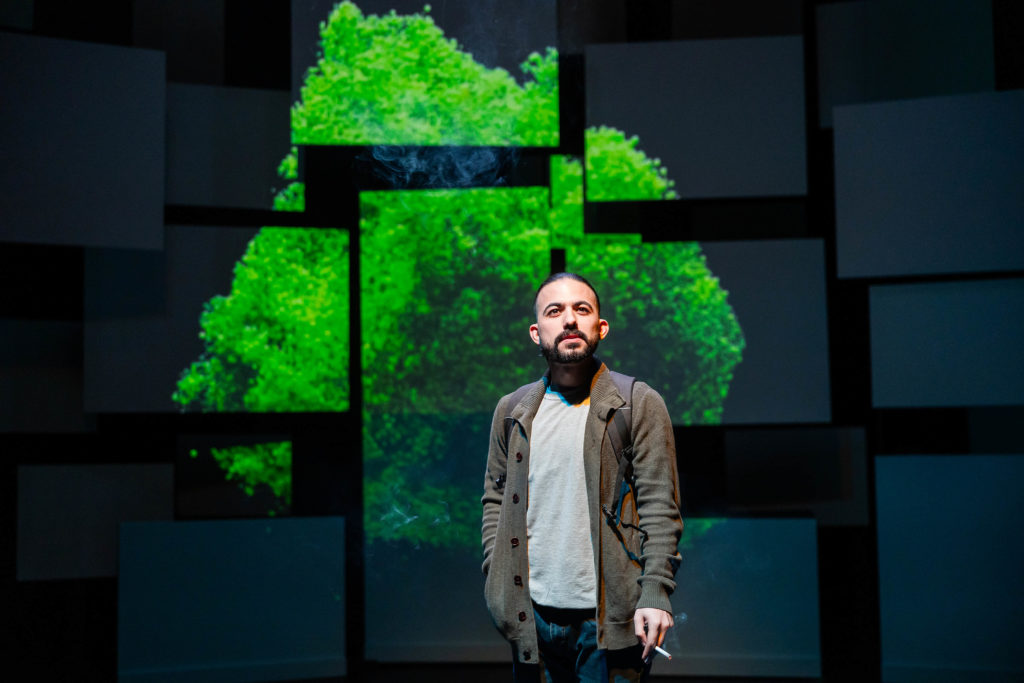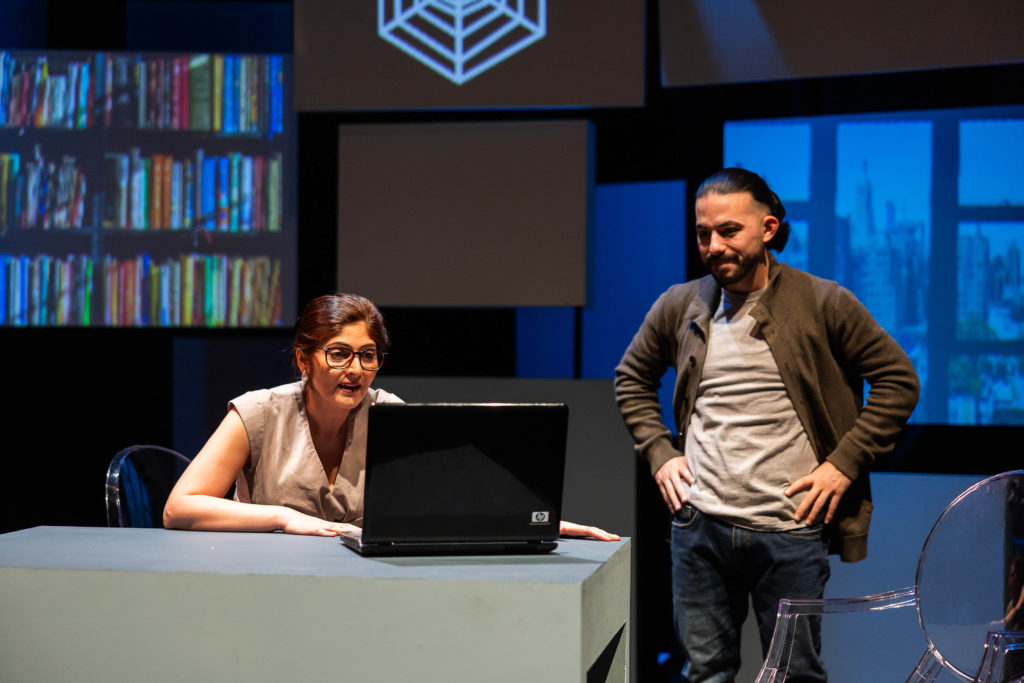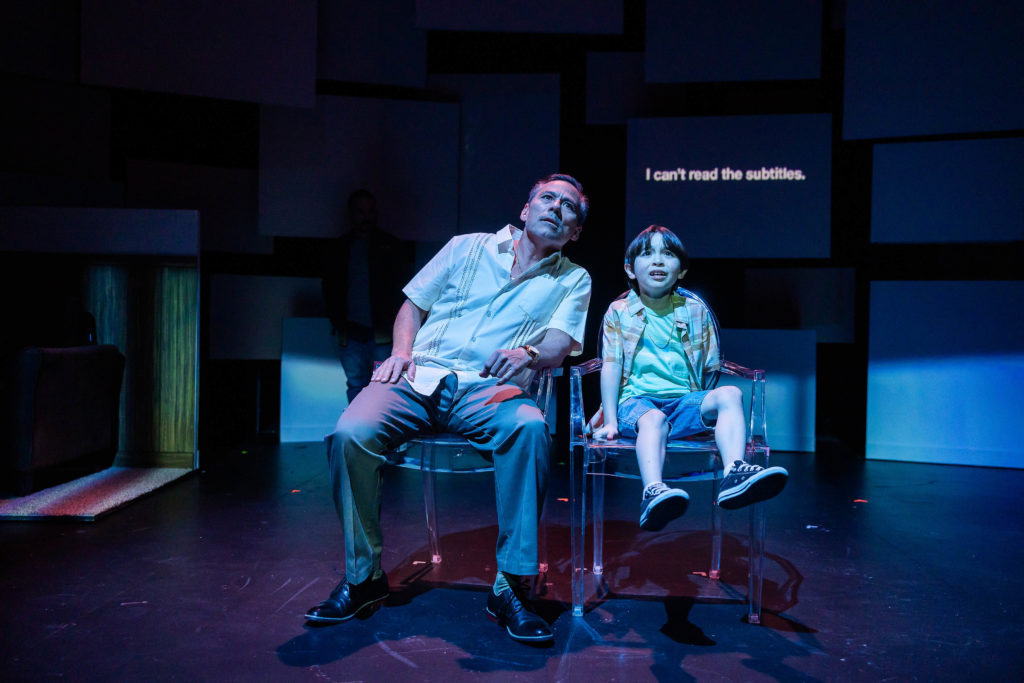
Armando Rivera. Photo: Nile Scott Studios.
Presented by Central Square Theater
Produced in partnership with Teatro Chelsea
A Catalyst Collaborative@MIT Production
Written by Francisco Mendoza
Directed by Gabriel Vega Weissman
Dramaturgy by Sofia Cardona
January 25 – February 25. 2024
Central Square Theater
450 Massachusetts Avenue
Cambridge, MA 02139
Machine Learning runs approximately 100 minutes with no intermission.
Content warning: Themes of addiction, toxic masculinity, a child in an emotionally and mentally abusive environment, and human suffering.
Prop cigarettes are used in this production.
Critique by Kitty Drexel
CAMBRIDGE, Mass. — Machine Learning by Francisco Mendoza is presented jointly by Central Square Theater and Teatro Chelsea. It is directed by Gabriel Vega Weissman and will play at Central Square Theater in Cambridge, MA through February 25.
Machine Learning imagines a world where the abilities of AI have grown far past ChatGPT and Siri. Jorge (Armando Rivera) is a promising but aimless grad student without a university to sponsor his work. Anita (Sugandha Gopal), a robotics and AI professor agrees to bring Jorge into her program on the condition that Jorge will choose a project and stick with it.
Jorge invents Arnold (Gabriel Vega Weissman on Feb. 3), an AI assistant program capable of monitoring a human’s health. He charges Arnold with caring for Jorge’s estranged father, Gabriel (Jorge Alberto Rubio). Gabriel is suffering the ill effects of liver cancer from a life of alcoholism and denial. Xavier Rosario plays young Jorge.
While Arnold is a brilliant piece of tech with learning capabilities beyond anything the world has seen before, Arnold is still a computer program. Arnold cannot comprehend the complicated relationship between a father struggling against addiction and his distanced son. Arnold can only see the exchanges between the two men, learn from their behaviors, and suggest a course of treatment.
Machine Learning ponders how human relationships will change when machines are introduced to interpret them. Machines cannot feel. They do not have moral codes. Humans do have emotions and moral codes. Sometimes, an objective outsider is required to make amends for past mistakes.
Machine Learning at Central Square Theater – Highlights from Central Square Theater on Vimeo.
The adult parent-child relationship between Gabriel and Jorge is difficult to watch. Gabriel is an addict and refuses to see the damage he has done to himself and his relationship with Jorge. Jorge is a workaholic who becomes Gabriel’s caregiver. Jorge keeps advising Gabriel to change his habits, but Gabriel refuses. Gabriel would rather numb himself by drinking.
Rubio and Rivera have a strong rapport onstage. Their portrayal of hostile family members is convincing. Gabriel and Jorge are two men who want to love each other but have no common emotional language to express their genuine affection for each other. They are hard to watch.
Machine Language discusses the consequences of toxic masculinity. Toxic masculinity is deeply harmful to all people on the gender spectrum. It shouldn’t be easy to watch.
Sugandha Gopal (with the presence of Shohreh Aghdashloo) brought sophistication and prestige to the role of Anita, Jorge’s academic advisor. She enhanced every scene she was in.

Sugandha Gopal and Armando Rivera. Photo: Nile Scott Studios.
Machine Learning jumps between 2002, 2015, and 2016. Its scenes unfold as Jorge relays memories to Arnold to improve Arnold’s programming and Gabiel’s care. The set designed by Janie E Howland rolls away from its walls the way Jorge’s memories roll from his consciousness. An actor turns from the audience and a couch is exposed like a vulnerability in a fortress. In one scene, Gabriel announces he’s going to vomit and a toilet magically appears. Screens surround the stage so Arnold sees it all.
The projection design by SeiAllah Salotto-Cristobal visually explains complicated programming concepts that the characters discuss in real-time. They are embellished by lighting designer Amanda Fallon and sound designer David Ramos’ work.

Jorge Alberto Rubio and Xavier Rosario. Photo: Nile Scott Studios.
The wardrobe work of Kiara Escalera was so natural to the play’s actors that the characters looked like they had brought clothing from home. Gabriel’s boxers are the physical representation of depression. They looked so bad I could smell them.
It is good to see Central Square Theater working with Teatro Chelsea. They, like some other local companies, are enabling artistic growth. This is how theatre will survive the post-pandemic, late-stage capitalism era: collaboration.
Survival must be communal, not competitive. We must uplift our work together. Our future is our community.
UPDATE: This article previously credited costuming to the incorrect designer. Credit belongs to Kiara Escalera for the costume design.
